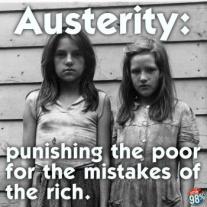From Lars Syll The euro may be approaching another crisis. Italy, the eurozone’s third largest economy, has chosen what can at best be described as a Euroskeptic government. This should surprise no one. The backlash in Italy is another predictable (and predicted) episode in the long saga of a poorly designed currency arrangement, in which the dominant power, Germany, impedes the necessary reforms and insists on policies that exacerbate the inherent problems, using rhetoric seemingly intended to inflame passions. Italy has been performing poorly since the euro’s launch. Its real (inflation-adjusted) GDP in 2016 was the same as it was in 2001. But the eurozone as a whole has not been doing well, either … If one country does poorly, blame the country; if many countries are doing poorly,
Topics:
Lars Pålsson Syll considers the following as important: Uncategorized
This could be interesting, too:
tom writes The Ukraine war and Europe’s deepening march of folly
Stavros Mavroudeas writes CfP of Marxist Macroeconomic Modelling workgroup – 18th WAPE Forum, Istanbul August 6-8, 2025
Lars Pålsson Syll writes The pretence-of-knowledge syndrome
Dean Baker writes Crypto and Donald Trump’s strategic baseball card reserve
from Lars Syll
The euro may be approaching another crisis. Italy, the eurozone’s third largest economy, has chosen what can at best be described as a Euroskeptic government. This should surprise no one. The backlash in Italy is another predictable (and predicted) episode in the long saga of a poorly designed currency arrangement, in which the dominant power, Germany, impedes the necessary reforms and insists on policies that exacerbate the inherent problems, using rhetoric seemingly intended to inflame passions.
Italy has been performing poorly since the euro’s launch. Its real (inflation-adjusted) GDP in 2016 was the same as it was in 2001. But the eurozone as a whole has not been doing well, either … If one country does poorly, blame the country; if many countries are doing poorly, blame the system … The euro was a system almost designed to fail. It took away governments’ main adjustment mechanisms (interest and exchange rates); and, rather than creating new institutions to help countries cope with the diverse situations in which they find themselves, it imposed new strictures – often based on discredited economic and political theories – on deficits, debt, and even structural policies.
The euro was supposed to bring shared prosperity, which would enhance solidarity and advance the goal of European integration. In fact, it has done just the opposite, slowing growth and sowing discord …
The central problem in a currency area is how to correct exchange-rate misalignments like the one now affecting Italy. Germany’s answer is to put the burden on the weak countries already suffering from high unemployment and low growth rates. We know where this leads: more pain, more suffering, more unemployment, and even slower growth …
Across the eurozone, political leaders are moving into a state of paralysis: citizens want to remain in the EU, but also want an end to austerity and the return of prosperity. They are told they can’t have both. Ever hopeful of a change of heart in northern Europe, troubled governments stay the course, and the suffering of their people increases …
Germany and other countries in northern Europe can save the euro by showing more humanity and more flexibility. But, having watched the first acts of this play so many times, I am not counting on them to change the plot.
The euro has taken away the possibility for national governments to manage their economies in a meaningful way — and in Italy, just as in Greece a couple of years ago, the people have had to pay the true costs of its concomitant misguided austerity policies.
The unfolding of the repeated economic crises in euroland during the last decade has shown beyond any doubts that the euro is not only an economic project but just as much a political one. What the neoliberal revolution during the 1980s and 1990s didn’t manage to accomplish, the euro shall now force on us.
 But do the peoples of Europe really want to deprive themselves of economic autonomy, enforce lower wages and slash social welfare at the slightest sign of economic distress? Is increasing income inequality and a federal überstate really the stuff that our dreams are made of? I doubt it.
But do the peoples of Europe really want to deprive themselves of economic autonomy, enforce lower wages and slash social welfare at the slightest sign of economic distress? Is increasing income inequality and a federal überstate really the stuff that our dreams are made of? I doubt it.
History ought to act as a deterrent. During the 1930s our economies didn’t come out of the depression until the folly of that time — the gold standard — was thrown on the dustbin of history. The euro will hopefully soon join it.
Economists have a tendency to get enthralled by their theories and model and forget that behind the figures and abstractions there is a real world with real people. Real people that have to pay dearly for fundamentally flawed doctrines and recommendations.
